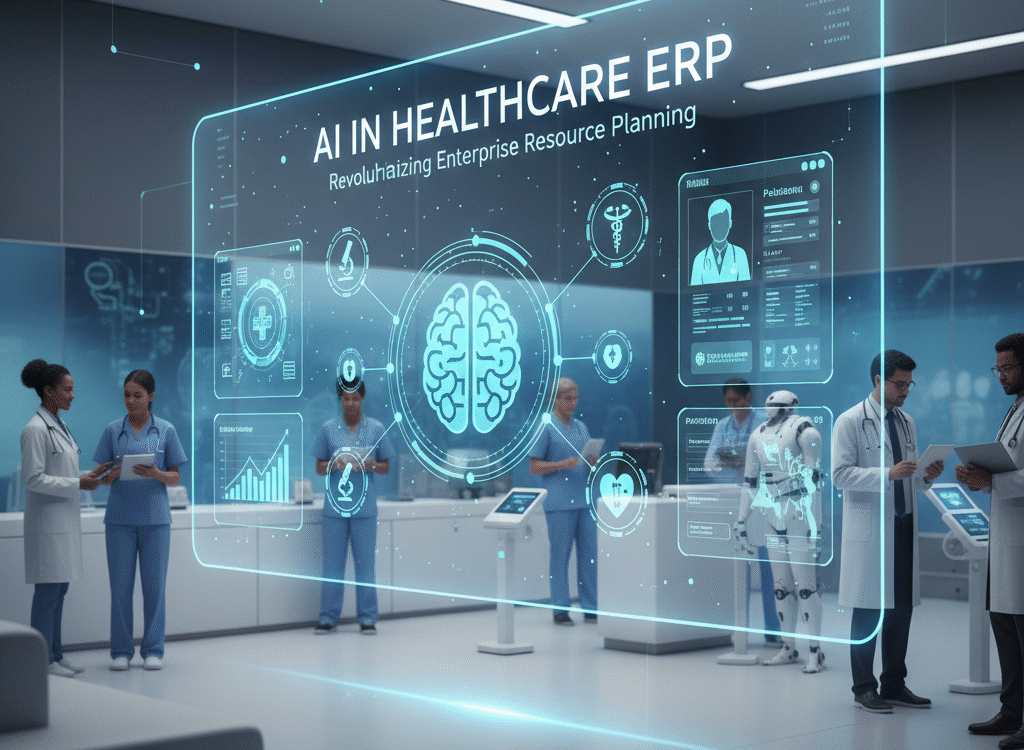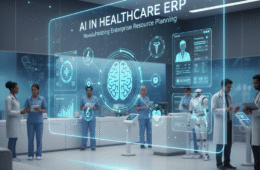
Introduction to AI in Healthcare ERP
The healthcare industry is undergoing a rapid digital transformation, and the role of AI in Healthcare ERP has become increasingly significant. Hospitals and clinics are now adopting advanced Healthcare ERP solutions to improve patient data management and enhance operational efficiency. Compared to traditional systems, AI-enabled ERP platforms not only centralize data but also reduce errors and support real-time decision-making, ensuring better patient care outcomes.
High-quality patient care relies heavily on accurate and timely data. However, healthcare providers often face challenges such as manual record-keeping, duplicate data, and delayed access to crucial patient information. By implementing AI-powered Healthcare ERP solutions, hospitals can streamline patient data management, automate routine processes, and provide doctors and staff with actionable insights, improving both efficiency and patient satisfaction.
In this blog, we will explore how AI in Healthcare ERP is transforming patient data management in hospitals and clinics. We will cover core features, benefits, implementation challenges, and future trends that ERP development companies like Speetrance can offer to their healthcare clients. This guide will also help healthcare decision-makers understand how AI-integrated ERP systems can optimize operations, enhance patient care, and reduce administrative burdens.
Understanding Healthcare ERP Systems
A Healthcare ERP system is a centralized software solution designed to integrate and manage multiple operations of hospitals and healthcare organizations. Its primary objective is to streamline patient data management, billing, inventory, human resources, and appointment scheduling. When AI in Healthcare ERP is applied, these systems not only automate routine tasks but also enhance accuracy, reduce errors, and improve overall hospital efficiency.
The core modules of a Healthcare ERP system include patient management, electronic medical records (EMR), pharmacy and inventory management, billing, financial accounting, and human resource management. Each module optimizes specific operational processes, and with AI integration, these modules provide real-time data analytics and predictive insights. This enables healthcare professionals to make informed decisions, improving both patient outcomes and operational efficiency.
A well-implemented Healthcare ERP solution centralizes data from all hospital departments, eliminating duplicate entries and inconsistencies. AI-powered ERP systems also offer predictive analytics and smart alerts, helping doctors and staff take proactive decisions in critical patient care scenarios. By centralizing and automating data, hospitals can reduce administrative workloads, enhance patient management, and lower operational costs.
Leading ERP development companies in Kuwait like Speetrance design customized AI-enabled ERP solutions for healthcare organizations. These solutions focus not only on patient data management but also on enhancing patient experience, improving workflow efficiency, and ensuring secure and compliant data handling. With such systems, hospitals can optimize day-to-day operations and deliver high-quality care more effectively.
Role of AI in Healthcare ERP
The integration of AI in Healthcare ERP has become a game-changer for hospitals and healthcare organizations. By leveraging advanced AI technologies, these systems streamline operations, automate routine processes, and enhance decision-making. AI helps hospitals manage vast volumes of patient data efficiently while ensuring accuracy, compliance, and improved patient outcomes. The role of AI in Healthcare ERP can be divided into three major areas: technology integration, task automation, and enhanced decision-making.
AI Technologies in Healthcare ERP
AI-powered Healthcare ERP systems utilize technologies like machine learning, natural language processing (NLP), and predictive analytics. Machine learning enables the system to recognize patterns in patient data, predict future trends, and improve operational workflows. NLP helps in processing unstructured clinical notes and medical records, converting them into actionable insights. Predictive analytics forecasts patient needs, identifies high-risk cases, and supports preventive care. By combining these technologies, AI in Healthcare ERP transforms raw data into meaningful intelligence for healthcare providers.
Automating Routine Tasks with AI
One of the primary benefits of AI-powered Healthcare ERP solutions is automation. Routine tasks such as patient record updates, appointment scheduling, billing, inventory management, and reporting can be automated. Automation reduces human errors, improves efficiency, and ensures that patient data management remains consistent and accurate. Staff can redirect their time and effort toward patient care, improving overall hospital productivity. For instance, automated reminders for follow-up appointments help maintain patient engagement without manual intervention.
AI for Enhanced Decision-Making
AI-enabled ERP systems provide real-time analytics and actionable insights, which significantly enhance decision-making for healthcare professionals. Hospitals can analyze historical data, predict patient admission trends, and optimize resource allocation. Critical alerts powered by AI can notify staff about patient deterioration or abnormal lab results. By implementing AI in Healthcare ERP, healthcare providers can make proactive, data-driven decisions, improving patient outcomes and operational efficiency while maintaining high standards of compliance and data security.
Supporting Strategic Hospital Management
Beyond daily operations, AI in Healthcare ERP supports long-term strategic decision-making. Predictive models help hospital administrators plan capacity, budget allocation, and staffing requirements. AI insights also guide the implementation of personalized patient care programs and preventive healthcare strategies. With AI-powered reporting and dashboards, management gains complete visibility into hospital performance, allowing better planning, risk mitigation, and continuous improvement.
Improving Patient Data Management with AI
Effective patient data management is critical for modern hospitals, and AI in Healthcare ERP plays a pivotal role in transforming how healthcare organizations store, process, and use patient information. AI-enabled ERP systems centralize data, reduce errors, ensure compliance, and provide actionable insights for doctors and administrative staff.
Centralized Patient Records
AI-powered Healthcare ERP systems store all patient information in a single, centralized database. This includes medical history, lab results, prescriptions, billing information, and appointment schedules. By centralizing data, hospitals can eliminate duplicate records, reduce manual entry errors, and provide doctors with real-time access to patient information. Patient data management becomes faster, more accurate, and more efficient, enabling better healthcare delivery.
Enhancing Accuracy and Reducing Errors
Manual patient data entry is prone to errors that can impact treatment quality. AI in Healthcare ERP systems automatically validate data, flag inconsistencies, and maintain error-free records. Predictive AI algorithms can also detect anomalies in patient data, alerting staff to potential issues before they escalate. This ensures that hospitals maintain high-quality patient data management, improving patient safety and care outcomes.
Real-Time Data Updates for Doctors and Staff
With AI integration, Healthcare ERP systems provide real-time updates to all stakeholders. Doctors, nurses, and administrative staff receive immediate notifications about new test results, prescription changes, or patient admissions. Real-time patient data management ensures that care decisions are based on the most current information, reducing delays and improving treatment effectiveness.
Secure and Compliant Data Handling
Data security and compliance are paramount in healthcare. AI-powered ERP solutions help hospitals comply with regulations like HIPAA and GDPR by encrypting patient data, monitoring access, and maintaining detailed audit logs. By integrating AI in Healthcare ERP, hospitals can safeguard sensitive patient information while still making data accessible to authorized personnel for improved patient data management.
AI-driven Analytics for Patient Care
AI-driven analytics within Healthcare ERP solutions are revolutionizing patient care by turning large volumes of data into actionable insights. Hospitals can now use predictive models and real-time analytics to improve treatment outcomes, optimize resources, and make proactive care decisions.
Predictive Analytics for Patient Health Outcomes
AI-enabled ERP systems leverage predictive analytics to forecast patient health trends, identify potential complications, and recommend preventive measures. For example, by analyzing historical data, AI can predict the likelihood of readmissions or the risk of chronic disease progression. Hospitals using AI in Healthcare ERP can implement proactive care plans, improving patient data management and overall health outcomes.
AI-powered Patient Risk Assessment
Healthcare ERP solutions with AI can automatically assess patient risk by evaluating medical history, lab results, and lifestyle factors. This enables doctors to prioritize high-risk patients, allocate resources efficiently, and make timely interventions. AI-driven risk assessments enhance clinical decision-making and reduce adverse events, ensuring better patient safety.
Improving Treatment Plans Through Data Insights
AI analyzes patient records, treatment histories, and research data to suggest optimized treatment plans. By integrating AI-driven insights into the ERP system, healthcare providers can personalize care for each patient, reduce trial-and-error treatments, and improve recovery rates. AI in Healthcare ERP ensures that patient data management is not only accurate but also actionable, supporting evidence-based care.
Enhancing Operational Planning with Analytics
Beyond clinical decisions, AI-driven analytics help hospital administrators forecast patient volume, allocate staff efficiently, and manage inventory proactively. Real-time dashboards provide a complete overview of hospital operations, allowing management to make strategic decisions that improve efficiency, reduce costs, and enhance patient satisfaction.
Benefits of AI-enabled Healthcare ERP
Implementing AI in Healthcare ERP brings transformative benefits to hospitals and healthcare organizations. From operational efficiency to enhanced patient care, AI-powered ERP solutions optimize every aspect of hospital management while improving patient data management and overall outcomes.
H3: Increased Operational Efficiency
AI-powered Healthcare ERP systems automate routine administrative tasks such as scheduling, billing, inventory tracking, and reporting. By reducing manual processes, hospitals can save time and resources, allowing staff to focus more on patient care. AI in Healthcare ERP ensures that operations run smoothly, minimizing delays and errors while improving the overall efficiency of hospital workflows.
H3: Reduced Administrative Burden
Managing patient records, compliance reports, and operational data can be overwhelming for hospital staff. AI-enabled ERP solutions streamline these tasks by centralizing information, providing automated alerts, and simplifying reporting. This reduction in administrative workload not only improves staff productivity but also ensures accurate patient data management across the hospital.
H3: Enhanced Patient Experience and Engagement
AI in Healthcare ERP improves patient experience by providing timely communication, automated appointment reminders, and personalized care recommendations. Patients benefit from faster service, reduced waiting times, and more accurate treatment plans. By using AI-driven insights, hospitals can engage patients proactively, building trust and satisfaction while enhancing overall healthcare outcomes.
H3: Cost Reduction and Resource Optimization
AI-enabled Healthcare ERP solutions help hospitals reduce operational costs by optimizing staff allocation, predicting patient demand, and managing inventory efficiently. Predictive analytics allow administrators to anticipate resource requirements, preventing overstocking or shortages. With AI in Healthcare ERP, hospitals can achieve cost savings while ensuring that resources are effectively used for improved patient data management and care delivery.
Implementation Challenges and Considerations
While AI in Healthcare ERP offers numerous benefits, hospitals and healthcare organizations must carefully address several challenges during implementation. Proper planning and strategy ensure successful deployment, seamless adoption, and maximum ROI from AI-enabled ERP solutions.
Integration with Existing Systems
One of the primary challenges is integrating AI-powered ERP systems with existing hospital infrastructure. Many healthcare organizations have legacy systems for EMR, billing, or inventory management. AI-enabled Healthcare ERP solutions must be compatible with these systems to ensure seamless data flow. Proper integration prevents data silos, maintains patient data management accuracy, and allows staff to work without disruption.
Staff Training and Adoption
The success of AI-driven ERP systems depends heavily on staff adoption. Healthcare professionals need training to use new features, understand AI-generated insights, and adapt to automated workflows. ERP development companies Qatar like Speetrance provide training programs to ensure staff are confident using AI-enabled solutions. Encouraging adoption reduces resistance and maximizes the benefits of AI in Healthcare ERP.
Data Security and Privacy Concerns
Patient data is highly sensitive, and compliance with regulations like HIPAA and GDPR is mandatory. Implementing AI in Healthcare ERP requires strong data encryption, role-based access control, and monitoring mechanisms to protect information from breaches. Hospitals must ensure that patient data management practices are secure, compliant, and capable of safeguarding confidential patient records while leveraging AI insights.
Cost and Resource Considerations
Deploying AI-powered ERP systems involves investment in software, hardware, and training. Hospitals must carefully evaluate costs versus expected benefits. Choosing scalable and customizable Healthcare ERP solutions ensures long-term ROI, optimized operations, and improved patient data management without unnecessary financial strain.
Future of AI in Healthcare ERP
The future of healthcare is being shaped by AI in Healthcare ERP, which promises smarter, more efficient, and patient-centric hospital management. Emerging technologies and innovative AI applications are expected to redefine patient data management and operational workflows in hospitals worldwide.
Emerging Technologies and Trends
AI in Healthcare ERP is evolving rapidly with technologies like advanced predictive analytics, IoT integration, and AI-driven robotics. Hospitals will increasingly leverage AI for remote patient monitoring, real-time diagnostics, and intelligent workflow automation. These trends will enhance hospital efficiency and allow staff to focus more on patient care rather than administrative tasks.
AI and Personalized Medicine
The integration of AI enables personalized medicine by analyzing patient histories, genetic data, and lifestyle factors. AI-powered Healthcare ERP solutions can recommend tailored treatment plans, optimize medication doses, and predict health risks. This approach not only improves patient data management but also ensures that patients receive highly customized care for better health outcomes.
The Road Ahead for ERP Development Companies
ERP development company like Speetrance will continue to innovate AI-enabled Healthcare ERP solutions to meet evolving hospital needs. Future systems will focus on scalability, predictive intelligence, interoperability, and enhanced security. As AI continues to mature, hospitals will increasingly rely on ERP platforms to make data-driven decisions, improve patient outcomes, and optimize operational efficiency.
Conclusion
In conclusion, AI in Healthcare ERP is transforming the way hospitals manage patient data and optimize operations. By leveraging AI technologies like machine learning, predictive analytics, and natural language processing, hospitals can automate routine tasks, enhance patient data management, and make data-driven decisions that improve patient outcomes. AI-powered Healthcare ERP solutions not only streamline workflows but also enhance patient experience, reduce administrative burden, and ensure data security and compliance.
Companies like Speetrance, as leading ERP development companies, play a critical role in designing customized AI-enabled ERP systems that meet the unique needs of healthcare organizations. By adopting these solutions, hospitals can achieve operational efficiency, reduce costs, and deliver high-quality, patient-centered care. The future of healthcare lies in intelligent, AI-driven ERP platforms that empower hospitals to provide better, faster, and safer patient care.
FAQs- AI in healthcare ERP
What is the role of AI in healthcare ERP?
AI in Healthcare ERP enhances hospital operations by automating routine tasks, improving patient data management, providing predictive insights, and supporting data-driven clinical and administrative decisions.
How does AI improve patient data management?
AI centralizes patient records, validates data to reduce errors, provides real-time updates, and generates actionable insights, ensuring accurate and efficient patient data management.
Can AI ERP systems integrate with existing hospital systems?
Yes, modern Healthcare ERP solutions are designed to integrate seamlessly with legacy EMR, billing, and inventory systems, maintaining smooth data flow and reducing disruptions.
What are the main benefits of AI in healthcare operations?
AI-powered ERP improves operational efficiency, reduces administrative workload, enhances patient experience, ensures data accuracy, and optimizes resource allocation.
How secure is patient data in AI-enabled ERP systems?
AI-enabled Healthcare ERP systems use encryption, access controls, audit logs, and compliance with regulations like HIPAA and GDPR to ensure patient data security and privacy.





